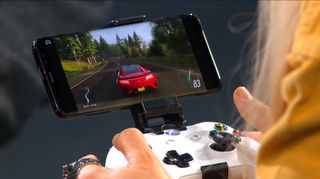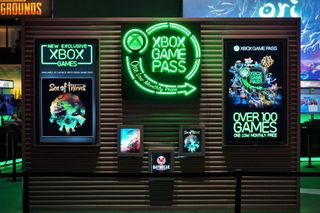How Project xCloud streaming will change Xbox One gaming
Project xCloud brings Xbox on-the-go, but there are changes you likely haven't considered.

Microsoft is scaling its Xbox "Project xCloud" game-streaming service, bringing top Xbox One titles across devices of all forms and dimensions. Major players are jumping into the streaming space and full-fledged gaming on-the-go will only be more prominent going forward. xCloud public demos are on the horizon for 2019, and we're continuing to learn more about the ambitious service.
However, with Project xCloud expanding to all-new product categories, existing Xbox One games will need to change. Here's what xCloud needs to consider to mobilize the Xbox portfolio.
Xbox Project xCloud game streaming: Everything we know
A smaller screen means bigger problems

Microsoft's first rollout of Project xCloud will target Android devices, paired with the benefits of the open mobile platform. While likely to expand to more mobiles, PCs, and consoles, the preliminary shift to Google's mobile OS packs the most significant hurdles ahead. Moving an existing game portfolio to the cloud and new devices isn't easy; with countless obstacles to address during its early days. The underlying cloud technology remains Microsoft's key innovation, though considering its target devices is equally crucial.
One fundamental change will be the display, switching out that spacious 60-inch TV setup for a six-inch handheld panel. On the surface, this means addressing TV-tailored design, by scaling menus, user interfaces, and text to account for reduced real estate. It also extends to more nuanced implications, where changes to visual cues and visibility will inevitably impact the phone experience.
Following its early Project xCloud reveal, Microsoft has addressed this concept at Game Developers Conference (GDC) 2019, discussing its "Cloud Aware" API to account for new devices. The fresh toolset will enable developers to build upon existing Xbox One code with streaming-specific changes and consider touch-enabled glass. And while dependent on developers tailoring games for the platform, increased interest from Google, Microsoft, and Sony will help drive adoption.
The differences of a mobile world

Project xCloud's promises will also change how Xbox One games play, with new device families likely bringing changes to expectations and experiences. In traditional console gaming, it's accepted to play multiple hours in a day, sometimes even in one sitting. Meanwhile, the mobile world fosters shorter play sessions; sometimes just minutes at a time. Expectations for Project xCloud shouldn't align with your typical mobile game, but lesser investment is unavoidable on mobile.
Get the Windows Central Newsletter
All the latest news, reviews, and guides for Windows and Xbox diehards.
As game streaming births mobile portals to console experiences, we may see more developers accounting for the concept. Microsoft has already touched on plans to address this during GDC 2019, under its Cloud Aware tools. Using the example of frequent save points, it shows how restructuring titles around devices can help accommodate the wider handheld market.
The cost of Xbox gaming is going to change

While Microsoft and Google talk future streaming services, pricing remains an untouched topic for both firms. The Google Stadia reveal sidestepped its financial angle entirely, while Microsoft is teasing xCloud and Xbox Game Pass will "co-exist in some reasonable way." The Netflix-style subscription approach has revolutionized video and music distribution, now presenting similar value for gamers. Though $60 pricing might be the norm for consoles, it needs to evolve for its mobile reach.
Most subscription services in video, music, and gaming split subscription revenue among developers based on viewership. However, without the original price for ownership, we may see more publishers push purchases beyond the cost of entry.
We've seen countless examples of deeper monetization, whether through microtransactions, expansions, exclusive passes, and other ways to retain post-purchase revenue. Following the success of free-to-play hits like Fortnite and Apex Legends too, similar monetization is fit for streaming platforms. However, with tough times for smaller indies and single-player games, this uncertain landscape for some is only here to stay.
It's still early days for Xbox Project xCloud and innumerable unanswered questions lay in the months ahead. However, game streaming is more advanced than ever, and 2019 could be a massive break for Microsoft's cloud ambitions. Let us know your thoughts on the current state of Project xCloud in the comments.

Netflix meets Xbox One gaming.
While Project xCloud is still far away, Microsoft's Xbox Game Pass is the closest alternative. It's a Netflix for games paid monthly, securing access to over 100 Xbox One titles.
Matt Brown was formerly a Windows Central's Senior Editor, Xbox & PC, at Future. Following over seven years of professional consumer technology and gaming coverage, he’s focused on the world of Microsoft's gaming efforts. You can follow him on Twitter @mattjbrown.

